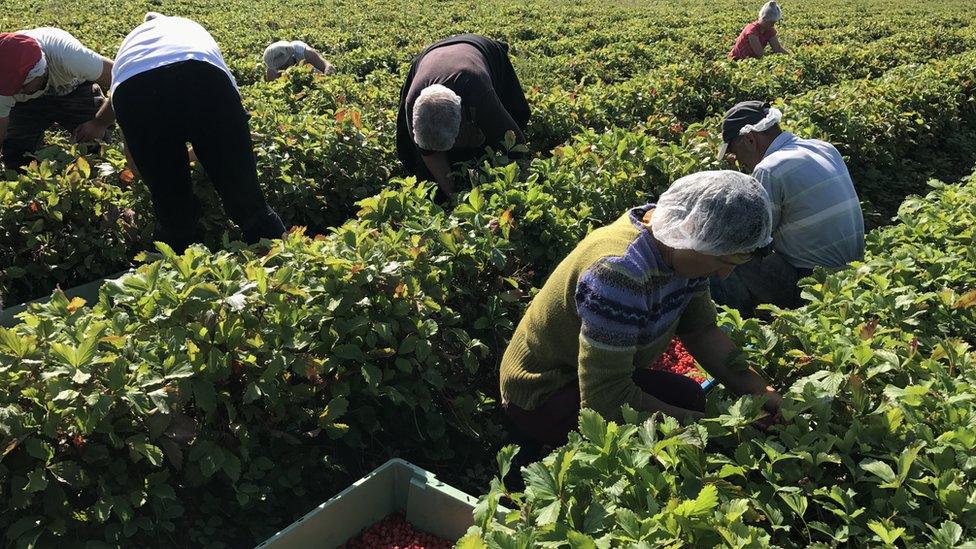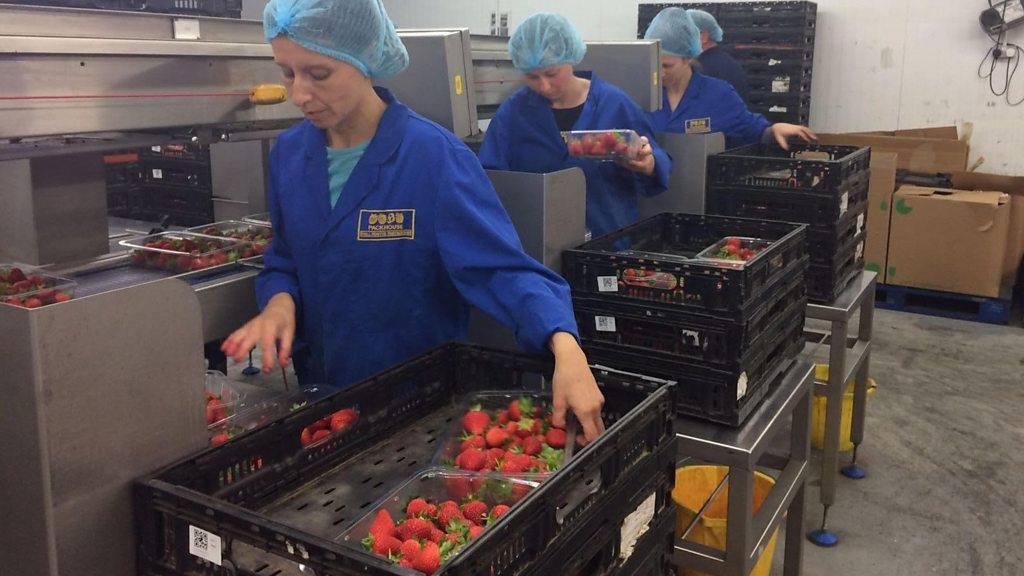Fruit and veg farmers facing migrant labour shortages
- Published
Fruit farmers are finding it hard to recruit pickers
UK summer fruit and salad growers are having difficulty recruiting pickers, with more than half saying they don't know if they will have enough migrant workers to harvest their crops.
Many growers blame the weak pound which has reduced their workers' earning power, as well as uncertainty over Brexit, according to a BBC survey.
About 80,000 seasonal workers a year pick and process British fruit and veg.
Most of them are from the European Union, mainly Romania and Bulgaria.
One in five growers says they already have fewer pickers than they need.
British Summer Fruits, the body which represents soft fruit growers, says labour shortages are now the worst seen since 2004.
Queen's Speech: Brexit bills dominate agenda
Ahmed: Immigration is Brexit dividing line
Bloom: Free trade area, single market, customs union - what's the difference?
Rolls-Royce warns against 'hard Brexit'
Carmakers 'face Brexit cliff edge'
Recruitment was getting harder even before the vote to leave the EU. But the industry believes Brexit is exacerbating the problem and if access to non-UK workers dries up, it could cripple home-grown berry production.
Big response
Their concern is backed up by an in-depth survey of growers by the BBC.
The questionnaire was sent to members of the British Leafy Salad Association and British Summer Fruits, which represent 90% of growers in their sector.
There was a big response. Three-quarters of growers completed the survey, which was carried out between 16 May and 5 June, as harvesting started to peak.
We asked if they had enough seasonal workers for the start of the main picking season:
32% said they weren't sure
18% said they had slightly fewer than they needed
Just over 3% reported having many fewer than required
42% said they had just enough
1% said they had more than enough
Meanwhile, 78% of respondents said recruitment had been more difficult than last year, with 20% saying it had been the hardest for years.
'Not comfortable'
At Wilkin and Sons in Essex, the picking season for strawberries is in full swing. But this year, they have 20% fewer workers than they would like.
"We're managing, but we're not comfortable," said joint managing director Chris Newenham.
Manager at fruit farm tells Today he has only been able to recruit one British person in five years
"Our seasonal workers are a critical resource for us to be able to save our crop each year. And the logical extension of not being able to harvest that crop is that we will have to bring our production in from overseas and that's a position none of us want to see. "
He's not the only one. Of those surveyed, 71% said they would consider reducing UK production if there were future restrictions on seasonal workers.
British Summer Fruits has commissioned its own separate report, just published, on the potential implications for its growers, and consumers, of Brexit.
It warns that soft fruit prices could rise by up to 50% if the UK relied solely on imports.
"It is inconceivable that people who voted to leave the European Union wanted to destroy an iconic and incredibly competitive British horticulture industry," said Laurence Olins, chairman of British Summer Fruits.
"Failure to secure the future of soft fruit production in the UK will have a negative impact on the economy, family budgets, the nation's health, UK food security and the environment," he added.
So why doesn't horticulture, now a £3bn industry, simply try to employ British workers?
The answer is straightforward for Beverley Dixon, from G's Fresh, which employs some 2,500 seasonal workers growing salad crops across large areas of Cambridgeshire and Norfolk, as well as other farms dotted across the UK.
"We operate in areas of such low unemployment, so here in Cambridgeshire, it's less than 1.5%," she said.
"So there simply aren't the people available to do the work, added to which UK people tend to want permanent year-round work and this is seasonal work.'

Reliance on migrant workers isn't a specific challenge for the UK, according to David Swales, analyst at the Agriculture and Horticulture Development Board.
"If we look at other developed countries around the world, places like Australia and New Zealand, they source labour from the Pacific Islands.
"In the US, they source labour from Mexico and the Caribbean countries. So there are a number of places where countries have to go outside their borders to source the seasonal workers that they need," he added.
Obvious solution?
The nationalities of these workers have changed over the decades in the UK. There used to be a seasonal agricultural workers scheme which allowed growers and farmers to attract workers from across the world.
The industry says it worked and believes it's the obvious solution now Britain has decided to leave the EU.
During a recent select committee inquiry into seasonal labour shortfalls, the government said net migration figures showed that sufficient labour was available in the UK and that there was currently no need for a seasonal agricultural workers scheme for migrants.
The BBC survey is hard evidence that recruitment has proved tougher this year, with some shortages reported.
A government spokesperson said: "The government places great value on the UK's food and farming industries, both as a crucial component of the UK economy and of the fabric of rural Britain.
"We are determined to get the best deal for the UK in our negotiations to leave the EU, not least for our world-leading food and farming industry, which is a key part of our nation's economic success."
- Published22 June 2017
